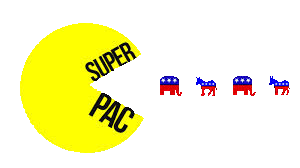In the past, articles in the online magazine Salon.com have referred to 527 groups as “shadowy“, “stealth PACs“, that “clearly enjoy a loophole in the campaign finance regime that ought to be plugged.”
We were both surprised and pleased to see that their most recent article on the subject avoids this rhetoric altogether. The article also demonstrates that political minorities may have the most to lose if the 527 “loophole” is closed.
The article tells the story of five individuals, Colorado software millionaire Tim Gill, Ohio billionaire Peter Lewis, businessman Adam Rose, and medical supplies heirs Jon Stryker and his sister Pat Stryker. Combined, these five gave $5,161,836 to federal 527 groups, placing all of them in the top 20 overall donors to such groups. What unites the five is that their donations “were either partially or entirely motivated by an effort to combat anti-gay legislation and defeat anti-gay incumbents.”
Kudos to these five. They were dissatisfied with the course of government and did something about it. They got involved in the way they deemed most effective, by giving generously of their wealth to support political causes they believed in. They were not always successful; some of the incumbents they opposed were reelected. What matters, though, is that previously comfortable incumbents were forced to work for reelection, persuading voters and motivating them to the polls. By increasing the amount of information available to voters, getting them to vote, and forcing their opponents to do the same, these five enhanced democratic competition.
And they did it all through a “loophole” that many advocates of campaign finance “reform” would like to see closed.
We disagree with the “reformers”. And, perhaps, so does Salon.com, for the article is surprisingly devoid of the typical buzzwords associated with 527 groups. There’s not a single “loophole”, “secret”, “shadowy”, or “stealthy” to be found.
We hope that this shift in terminology signals more than Salon.com’s pleasure at seeing Republicans defeated and Democrats elected. We hope it signals, first, recognition that the ability to donate freely in order to persuade fellow voters is an important safeguard for political minorities. It only took five wealthy individuals to have a persuasive, and in some cases decisive, effect on dozens of elections. If donations to 527s were capped at the current $5,000 limit that applies to political committees, it would have taken more than 1,000 individuals giving the maximum donation to raise $5 million (not counting any of the increased transaction costs associated with collecting 200 times as many donations). It can be difficult to find 1,000 people who have that kind of money to spend, and the smaller the political minority, the more difficult it becomes.
Second, we hope this article signals a more fundamental shift in their thinking, away from the tired rhetoric that money corrupts the political process and towards a principled stance in favor of free expression. That the message being advocated by these five may have been one that Salon.com agrees with is immaterial; it is always easier to support free speech, and the freedom to spend money making that speech heard, when one agrees with what is being spoken.
What really matters is that the millions of dollars given by these five wealthy individuals were spent persuading voters and motivating them to the polls, not bribing them. To say that the 527 “loophole” must be closed is to say that the individuals speaking are too persuasive, that voters cannot be trusted to make rational decisions in the face of such persuasion. But persuading others to one’s way of thinking is the very essence of deliberative democracy. Cutting out the deliberation reduces elections to superficial popularity contests, with all the democratic significance of a vote for prom queen.
In addition to this (potential) shift in Salon.com’s view of 527s, however, the article contains another surprise, one we find somewhat distressing:
Rose, whose previous largest single donation was $100,000 to the Democratic National Committee, doesn’t even believe in 527s and PACs. “I honestly think that federal campaigns should be publicly funded with identical dollars for every candidate. But this is the current system.”
It’s surprising that Rose feels this way, because the article demonstrates precisely why political minorities should support unlimited donations to 527s and resist a move towards taxpayer financing. Under such a system, not only is it likely that Rep. Sue Kelly would be returning to Congress next term, but her reelection–which Rose spent $500,000 opposing–would have been funded, in part, by Rose’s own tax dollars.
Regardless of how Rose feels about 527s, however, we at CCP will continue to support his right to donate money to them. And we will continue to oppose policies that would require Rose, or anyone else, to give a dime to any politician whose actions or message offends them.














